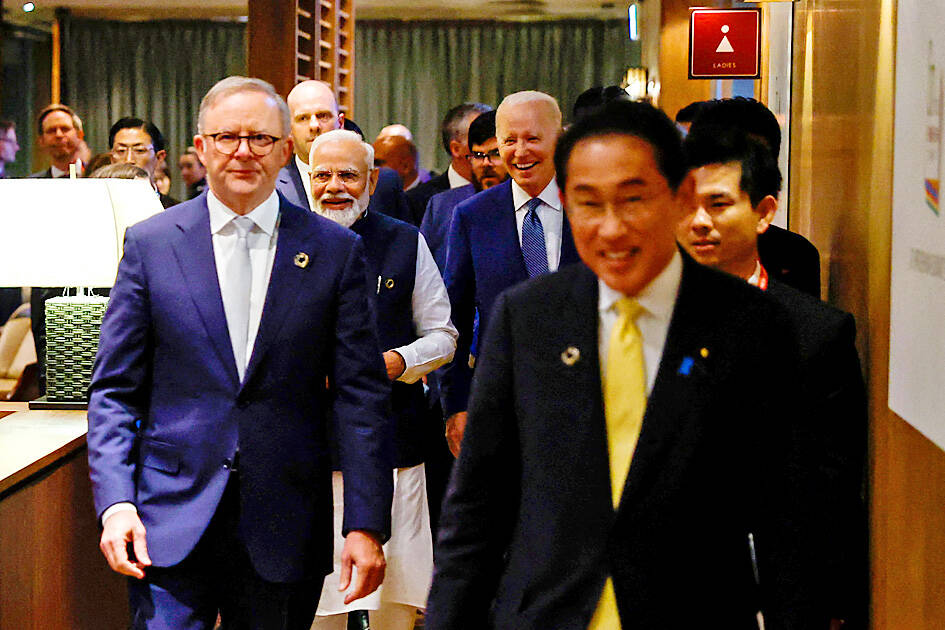G7 countries yesterday expressed “serious concern” about the situation in the East and South China seas, where Beijing has been expanding its military presence and threatening to use force to exert its control over Taiwan.
In a joint statement, the G7 leaders called for a “peaceful resolution” of China’s claim to Taiwan.
They said they did not want to harm China and were seeking “constructive and stable relations” with Beijing, “recognizing the importance of engaging candidly with and expressing our concerns directly to China.”

Photo: AFP
The statement said there was “no legal basis for China’s expansive maritime claims in the South China Sea, and we oppose China’s militarization activities in the region.”
“A growing China that plays by international rules would be of global interest,” the statement said, alluding to charges that Beijing is undermining the “rules-based international order.”
The G7 also united in voicing concerns about human rights in China, including in Tibet, Hong Kong and the far western region of Xinjiang, where forced labor is a perennial issue.
In Taipei, the Ministry of Foreign Affairs yesterday thanked the G7 for its “concrete course of action for three consecutive years that expressed their concern and emphasis on the peace and stability of the Taiwan Strait.”
As an important country in the Indo-Pacific region, Taiwan would continue to work with G7 members and other like-minded countries to bolster the “global democratic alliance,” uphold the rules-based international order, resist the oppression of authoritarianism, and maintain the liberty and openness of the Indo-Pacific region, as well as global peace, stability and prosperity, it said.
The G7 statement also called on Beijing to pursue peace in Ukraine.
“We call on China to press Russia to stop its military aggression, and immediately, completely and unconditionally withdraw its troops from Ukraine,” it said. “We encourage China to support a comprehensive, just and lasting peace based on territorial integrity and the principles and purposes of the UN Charter,” including in direct talks with Ukraine.
The statement also sought to counter accusations that the G7 is seeking to prevent China’s rise as a global power.
“Our policy approaches are not designed to harm China, nor do we seek to thwart China’s economic progress and development,” it said.
The statement highlighted a consensus that efforts to diversify manufacturing supply chains and ensure stable access to strategically vital minerals and other resources is not aimed at unraveling trade ties with the world’s second-largest economy.
“We are not decoupling or turning inwards,” the statement said. “At the same time, we recognize that economic resilience requires de-risking and diversifying. We will take steps, individually and collectively, to invest in our own economic vibrancy. We will reduce excessive dependencies in our critical supply chains.”
At the same time, the G7 members vowed to take a stand against “economic coercion,” saying they “will counter malign practices, such as illegitimate technology transfer or data disclosure,” while also avoiding “unduly limiting trade and investment.”
Additional reporting by staff writer

Right-wing political scientist Laura Fernandez on Sunday won Costa Rica’s presidential election by a landslide, after promising to crack down on rising violence linked to the cocaine trade. Fernandez’s nearest rival, economist Alvaro Ramos, conceded defeat as results showed the ruling party far exceeding the threshold of 40 percent needed to avoid a runoff. With 94 percent of polling stations counted, the political heir of outgoing Costa Rican President Rodrigo Chaves had captured 48.3 percent of the vote compared with Ramos’ 33.4 percent, the Supreme Electoral Tribunal said. As soon as the first results were announced, members of Fernandez’s Sovereign People’s Party

EMERGING FIELDS: The Chinese president said that the two countries would explore cooperation in green technology, the digital economy and artificial intelligence Chinese President Xi Jinping (習近平) yesterday called for an “equal and orderly multipolar world” in the face of “unilateral bullying,” in an apparent jab at the US. Xi was speaking during talks in Beijing with Uruguayan President Yamandu Orsi, the first South American leader to visit China since US special forces captured then-Venezuelan president Nicolas Maduro last month — an operation that Beijing condemned as a violation of sovereignty. Orsi follows a slew of leaders to have visited China seeking to boost ties with the world’s second-largest economy to hedge against US President Donald Trump’s increasingly unpredictable administration. “The international situation is fraught

MORE RESPONSIBILITY: Draftees would be expected to fight alongside professional soldiers, likely requiring the transformation of some training brigades into combat units The armed forces are to start incorporating new conscripts into combined arms brigades this year to enhance combat readiness, the Executive Yuan’s latest policy report said. The new policy would affect Taiwanese men entering the military for their compulsory service, which was extended to one year under reforms by then-president Tsai Ing-wen (蔡英文) in 2022. The conscripts would be trained to operate machine guns, uncrewed aerial vehicles, anti-tank guided missile launchers and Stinger air defense systems, the report said, adding that the basic training would be lengthened to eight weeks. After basic training, conscripts would be sorted into infantry battalions that would take

GROWING AMBITIONS: The scale and tempo of the operations show that the Strait has become the core theater for China to expand its security interests, the report said Chinese military aircraft incursions around Taiwan have surged nearly 15-fold over the past five years, according to a report released yesterday by the Democratic Progressive Party’s (DPP) Department of China Affairs. Sorties in the Taiwan Strait were previously irregular, totaling 380 in 2020, but have since evolved into routine operations, the report showed. “This demonstrates that the Taiwan Strait has become both the starting point and testing ground for Beijing’s expansionist ambitions,” it said. Driven by military expansionism, China is systematically pursuing actions aimed at altering the regional “status quo,” the department said, adding that Taiwan represents the most critical link in China’s